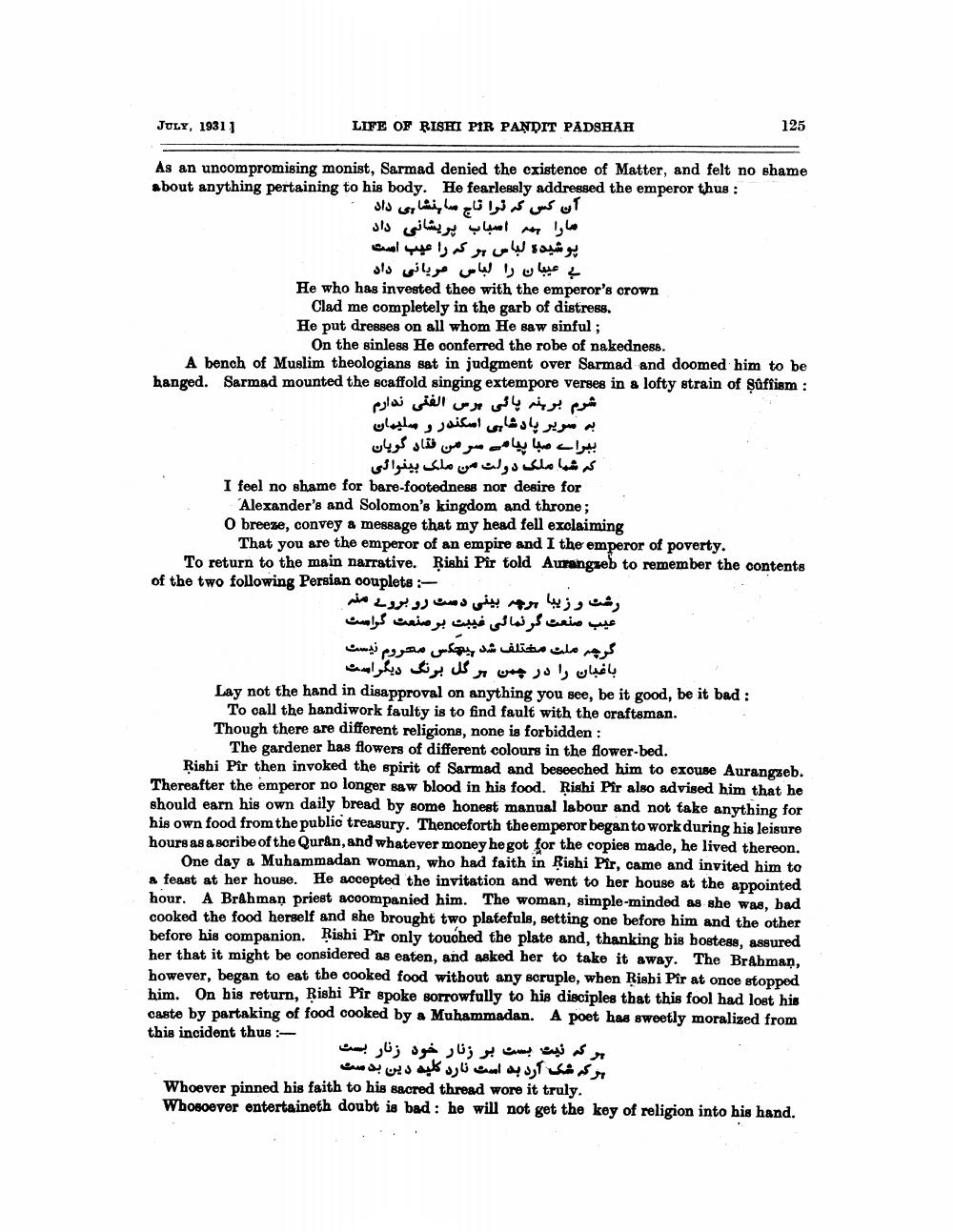________________
JULY, 1931)
LIFE OF RISHI PIR PANDIT PADSHAH
125
As an uncompromising monist, Sarmad denied the existence of Matter, and felt no shame about anything pertaining to his body. He fearlessly addressed the emperor thus :
-
که ترا تاج ماهنشاهی داد آن کس
داد یہ اسباب پریشانی مارا پوشیده لباس ہو کہ را عیب است
قربانی داد بے عیبان را لباس
He who has invested thee with the emperor's crown
Clad me completely in the garb of distress. He put dresses on all whom He saw sinful;
On the sinless He conferred the robe of nakedness. A bench of Muslim theologians sat in judgment over Sarmad and doomed him to be hanged. Sarmad mounted the scaffold singing extempore verses in a lofty strain of Suffism :
شرم برہنہ پائی بری الفتی ندارم به سریر پادشاهی اسکندر و سليمان ببراے صبا پیامے سر من فتاد گویان که شما ملک دولت من ملي بینوا دی
I feel no shame for bare-footedness nor desire for
Alexander's and Solomon's kingdom and throne; O breeze, convey & message that my head fell exclaiming
That you are the emperor of an empire and I the emperor of poverty. To return to the main narrative. Rishi Pir told Aurangzeb to remember the contents of the two following Persian couplets -
رشت و زیبا روی بینی دست رو بروے منہ عیب صنعت گرنما لي غيبت برصنعت گراست گرچہ ملت مختلف شد هیچکس محروم نیست
و گل برنگ دیگر است باغبان را در چمن
Lay not the hand in disapproval on anything you see, be it good, be it bad:
To call the handiwork faulty is to find fault with the craftsman. Though there are different religions, none is forbidden:
The gardener has flowers of different colours in the flower-bed. Rishi Pir then invoked the spirit of Sarmad and beseeched him to exouse Aurangzeb. Thereafter the emperor no longer saw blood in his food. Rishi Pir also advised him that he should earn his own daily bread by some honest manual labour and not take anything for his own food from the public treasury. Thenceforth the emperor began to work during his leisure hours as a scribe of the Quran, and whatever money he got for the copies made, he lived thereon.
One day a Muhammadan woman, who had faith in Rishi Pir, came and invited him to a feast at her house. He accepted the invitation and went to her bouse at the appointed hour. A Brahman priest accompanied him. The woman, simple-minded as she was, bad cooked the food herself and she brought two platefuls, setting one before him and the other before his companion. Rishi Pir only touched the plate and, thanking bis bostess, assured her that it might be considered as eaten, and asked her to take it away. The BrAhman, however, began to eat the cooked food without any scruple, when Risbi Pir at once stopped him. On his return, Rishi Pir spoke sorrowfully to his disciples that this fool had lost his caste by partaking of food cooked by a Muhammadan. A poet has sweetly moralized from this incident thus -
جو کہ نیت بست بر زنار خود زنار بست ہوکہ شک آرد بد است نارد کلیه دین بدست
Whoever pinned his faith to his sacred thread wore it truly. Whosoever entertaineth doubt is bad : he will not get the key of religion into his hand.




